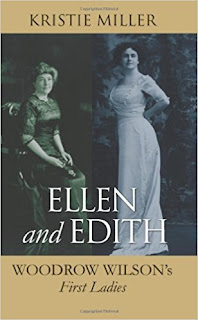Although most of the attention when it comes to the Wilson First Ladies is on Edith, Ellen did a lot more to change the role for future First Ladies.
Edith gets a notorious reputation because, in 1919, Woodrow Wilson suffered a stroke when he was on a tour promoting his League of Nations idea. Wilson had a long recovery ahead of him and under doctor’s orders rested behind closed doors while he recovered. He didn’t even have a cabinet meeting for 8 months. At the time not many people knew what was ailing the president. Everyone was just told that Wilson had nervous exhaustion. Edith served as the gatekeeper to decide what was important enough to warrant his energy and attention. Otherwise, it seems that Edith made political and governmental decisions that were not hers to make. Edith is accused of being the acting president during this time.
 |
| Edith Wilson |
Biographers Kristie Miller and John Milton Cooper have sympathy for Edith. It’s not that she was power hungry. She was just doing what she could to protect her husband’s health while preserving his presidency and legacy. And there was no precedent for this event. There was no constitutional provision for a disabled president.
Wilson eventually regained his health enough to function as president. When his presidency ended he and Edith moved into a house close to the White House. There Wilson died in 1924 and Edith remained until her death in 1961.
But before there was Edith, there was Ellen.
 |
| Ellen Wilson |
Ellen and Woodrow meet in church one Sunday in 1883 when Woodrow was visiting town and worshipping at the Presbyterian church where Ellen’s dad was the minister. Woodrow couldn’t take his eyes off of her despite her black mourning veil for her recently deceased mother. Ellen found in Woodrow the intelligent and interesting man that she had been looking for. Their relationship was passionate as told through the library-sized collection of love letters to each other. Ellen and Woodrow married and had three daughters.
 |
| One of the many love letters from Woodrow Wilson to Ellen Axson. |
Ellen was smart. She spurred Woodrow on intellectually. She was also a gifted painter although once she was First Lady she had a hard time knowing whether people really liked her art or if they were just trying to flatter the First Lady. Before her First Lady term, she was recognized as a painter and even held a one woman art show.
Ellen Wilson, although she is First Lady for a little longer than a year, makes her mark on the role by choosing a cause and using her government ties to get some “municipal housekeeping” done. Other ladies had passions and causes, but Ellen wisely used her connections to get government funding and interest in her cause. Ellen’s cause was the alleyways of Washington D.C. which were shacks without plumbing that poor families were calling home. She visited the dwellings herself and then visited model homes built by the Sanitary Housing Company to see what shelters could replace the alleyways. She took members of Congress to see the slums for themselves and eventually Congress created a committee and gave funding to build better housing for the alleyways.
Other First Ladies had causes, like Frances Cleveland and her kindergarten movement, but they relied more heavily on philanthropists like Harriet Lane to fulfill the needs. Ellen used her role to get government action and provision to meet the need.
Ellen is the First Lady I have been waiting to read about! I didn’t know it was her, but I knew that someone along the line would set the example of having a non-partisan cause to present to the legislature.
Ellen’s alleyway cause further shapes the First Lady role for future First Ladies like Eleanor Roosevelt (who was a Congress wife during Wilson’s term and who went along with Ellen to see the alleyways for herself).
Edith tries to shape the role a bit too far in her decision-maker status and garners lasting criticism which begins in her day and has lasted through the present day.
In preperation for this blog post and as part of my goal to read a biography of each of the First Ladies in chronological order, I read Kristie Miller's book, Ellen and Edith Wilson: Woodrow Wilson's First Ladies. The book was well-researched a little on the dry side, but still a pleasure to read. However, Kristie Miller was anything but dry when she was featured along with John Milton Cooper on C-SPAN's Influence and Image series to discuss the Wilson ladies.
In preperation for this blog post and as part of my goal to read a biography of each of the First Ladies in chronological order, I read Kristie Miller's book, Ellen and Edith Wilson: Woodrow Wilson's First Ladies. The book was well-researched a little on the dry side, but still a pleasure to read. However, Kristie Miller was anything but dry when she was featured along with John Milton Cooper on C-SPAN's Influence and Image series to discuss the Wilson ladies.




